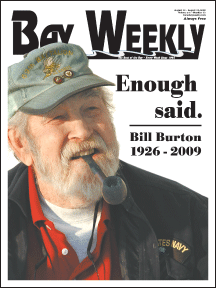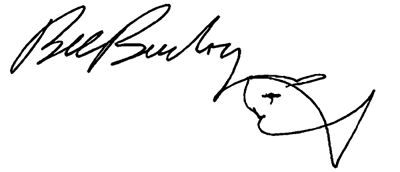
Volume XVII, Issue 33 # August 13 - August 19, 2009 |
 |
|
|
Enough Said
|
Editor’s note: Bill was interviewed by editor Sandra Olivetti Martin on December 22, 2008, and recorded and edited by retired Smithsonian audio-visual chief Tom Tearman. Hear Bill Burton and see images of his life online in a four-minute slide show, “Bill Burton Remembered,” at http://www.youtube.com/watch?v=dTxOldtb4AE. Thanks to the Burton family and to friend Alan Doelp for photos. The photos were selected and arranged by Diana Beechener and Ashley Goodman. The montage is the work of Beechener and Margaret Tearman. |
Bill Burton’s last words:
Do it. Do it. Do it.
I have had a wonderful life. It’s been wonderful because I have six children, 13 grandchildren and a couple of great-grandchildren. That’s nice because that’s an accomplishment that goes on and on.
But there are so many other things. The people I’ve met … the things I’ve seen … and there was a lot of love. Let’s face it: There was a lot of love.
I was a Depression kid, and you never aspired to anything other than living … getting by. There were so many things that I thought of as a boy — or didn’t dare think of as a boy — that I did get to do. I never thought that I would fish with the greatest literary figure of my time, Hemingway, or that I would fish with a couple of presidents. Or that I’d do a lot of different things. It just never entered your mind because it was different then. We were very poor, dirt farmers.
My grandmother, she was such a wonderful woman, she said to me, “Doodle” (she called me Doodle), “Doodle, whatever you want to do in your life, you can do if you just set your mind to it.”
I’m not really a very driven person. I don’t have many attributes that I can point to. My last English course was as a sophomore in high school. But I always was a very inquisitive person. I always tried to look at the other side of something or to find what would interest anyone in someone.
When I went with the [Baltimore Evening] Sun, there were only about seven or eight full-time newspaper outdoors writers in the country. I didn’t always just write about the person who shot a duck or a deer or caught a big bass. I liked to sneak in there why he was able to get that duck or the goose or how that bass happened to be in those waters. How it evolved over time. So all of a sudden [my reader] started thinking, damn it, I’m learning something that I never thought of.
If people didn’t dig out something new and something different, whether it’s controversial … Whatever it is, it has to be dug out, it has to be brought to the surface and people follow it, they like it.
This is new, it’s something they hadn’t thought of or something they had long forgotten or just a reminder of their own life. When you write something that reminds a person of his or her life at some earlier point, you’ve grabbed them, you’ve got them, you’ve got their attention.
To this day, I want to write because I’ve got an idea and I want to put it out. This is the greatest part of all writing. You’ve got something and you’ve got to put it down and you can’t wait to do it. You’re afraid you’re going to miss a little angle of it, miss something about it, and you don’t want that to happen.
I think too many people are rigid; they set their own rules. The rules should be set by the readers. I’ve never worried about an editor. I’ve never worried about anyone else. I just always think of my readers. What would the reader want? Because the readers have been the people who’ve been so good to me.
I started off as a dumb Vermont country boy. Probably would have been a mechanic or a farmer. I started to write, and some people liked it. And I just never became the farmer or the mechanic.
I’m still a Vermont country boy.
And what better life could you have?
Just dare to think that you could do it. And then try to do it. And you probably will do it.
I just do want to say that if you’ve got an idea, you have an idea, you want to do something or you at least want to explore it, do it. Do it. Do it.

